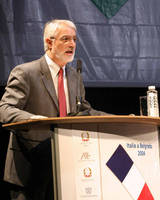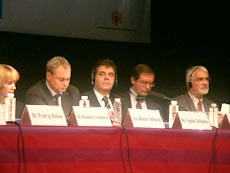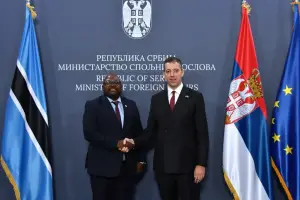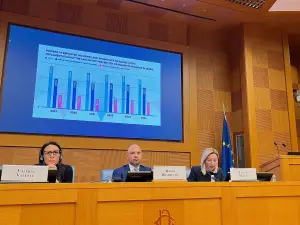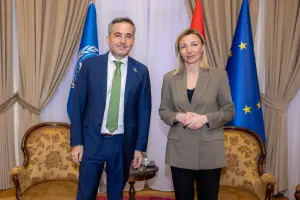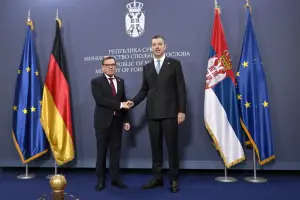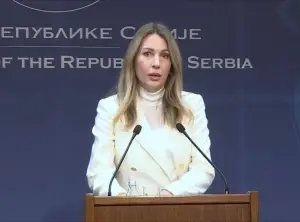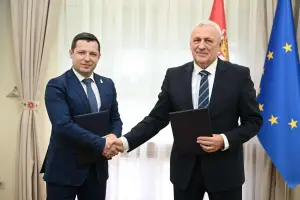Q:
A:
Prime Minister Kostunica invites Italian companies to invest in Serbia
Belgrade,
18 October 2004
Serbian Prime Minister Vojislav Kostunica said that the country's investment risk was substantially reduced over the past six months, noting that Serbia has attracted a number of foreign investors and trimmed interest rates.
Opening the plenary session of the "Italia a Belgrado 2004" business event today, Kostunica said that Serbia is making every effort to further improve its investment climate.
The government has created a legal framework for foreign investment and continuing privatisation through public auctions and tenders, and is working to improve the efficiency of its judiciary system, the Prime Minister noted, adding that the state will also seek to strengthen the small and medium-sized enterprise sector.
Even though Italy is Serbia's third-largest foreign trade partner and the second-biggest importer of Serbian goods, Italian companies have failed to make substantial foreign direct investment in Serbia, said Kostunica.
He voiced hope that the business meeting will help present Serbia's investment opportunities to Italian businessmen and that firms from Italy will soon launch operations in Serbia, adding that he is certain that market proximity is not Serbia's only advantage.
According to Serbian Deputy Prime Minister Miroljub Labus, "Italia a Belgrado 2004" aims to bring the two countries' economic and financial relations up to the level of their political ties, which he described as excellent.
Political stability has helped reduce Serbia's investment risk to the level of that in Bulgaria or Romania, said Labus, stressing that the country has also achieved macroeconomic stability, which is a key precondition for long-term investment.
Once the parliament adopts a budget revision plan, Serbia will resolve its debt problem and receive a credit rating, he added.
The Deputy Prime Minister went on to say that he expects the European Union to give the green light for a feasibility study for the Stabilisation and Association Agreement in the first quarter of 2005 and the Agreement to be signed by the end of next year.
He also noted that Serbia is due to sign a textile export accord with the EU and to resume talks with the International Monetary Fund (IMF) later this week as part of the third review under the three-year extended arrangement.
The agreements with the IMF and the London Club of commercial creditors will reduce Serbia's debt burden by $2.5 billion, Labus stressed, adding that the country's economy will grow between six and eight percent this year, with growths in industrial production and agriculture already at six and ten percent respectively.
The Deputy Prime Minister also said that he expects appropriate measures to reduce the impact of hikes in oil prices and inflation rate increase, adding that Serbia's GDP growth will stand at between 4.5 percent and 5.5 percent next year.
The government has created a legal framework for foreign investment and continuing privatisation through public auctions and tenders, and is working to improve the efficiency of its judiciary system, the Prime Minister noted, adding that the state will also seek to strengthen the small and medium-sized enterprise sector.
Even though Italy is Serbia's third-largest foreign trade partner and the second-biggest importer of Serbian goods, Italian companies have failed to make substantial foreign direct investment in Serbia, said Kostunica.
He voiced hope that the business meeting will help present Serbia's investment opportunities to Italian businessmen and that firms from Italy will soon launch operations in Serbia, adding that he is certain that market proximity is not Serbia's only advantage.
According to Serbian Deputy Prime Minister Miroljub Labus, "Italia a Belgrado 2004" aims to bring the two countries' economic and financial relations up to the level of their political ties, which he described as excellent.
Political stability has helped reduce Serbia's investment risk to the level of that in Bulgaria or Romania, said Labus, stressing that the country has also achieved macroeconomic stability, which is a key precondition for long-term investment.
Once the parliament adopts a budget revision plan, Serbia will resolve its debt problem and receive a credit rating, he added.
The Deputy Prime Minister went on to say that he expects the European Union to give the green light for a feasibility study for the Stabilisation and Association Agreement in the first quarter of 2005 and the Agreement to be signed by the end of next year.
He also noted that Serbia is due to sign a textile export accord with the EU and to resume talks with the International Monetary Fund (IMF) later this week as part of the third review under the three-year extended arrangement.
The agreements with the IMF and the London Club of commercial creditors will reduce Serbia's debt burden by $2.5 billion, Labus stressed, adding that the country's economy will grow between six and eight percent this year, with growths in industrial production and agriculture already at six and ten percent respectively.
The Deputy Prime Minister also said that he expects appropriate measures to reduce the impact of hikes in oil prices and inflation rate increase, adding that Serbia's GDP growth will stand at between 4.5 percent and 5.5 percent next year.
The Serbian Deputy Prime Minister said that Serbia has a large trade deficit with Italy and that the relation between export and import is five to two. Labus voiced hope that by investing in Serbia, Italian investors will help balance that ratio and improve it in the long run, which is of mutual interest.
Labus said that a new concept of economic policy has been adopted in Serbia, which envisages changes in firms and banks. That is a basis for creating macroeconomic conditions which help keep macroeconomic stability.
Changes in the banking system are currently underway, aimed at increasing domestic saving, reducing interest rates, increasing investment and thus increasing export. The other group of measures are aimed at attracting foreign direct investment, Labus stressed.
He added that a series of small red tape obstacles must be eliminated in order to increase investment. The introduction of the value added tax will significantly cut down the grey economy and at the same time, the commercial investment risk.
Labus voiced hope that today's conference will contribute to increasing the investment activities of Italian businessmen, and that it will be a cornerstone for boosting the overall economic cooperation between Serbia and Italy.
Serbian Minister of International Economic Relations Predrag Bubalo said that Serbia is emerging as a new investment destination in the region, which is the result of the continuous improvement of investment climate.
He told the participants in the meeting that more than 1,000 foreign companies are currently doing business in Serbia, including Siemens, US Steel, Henkel, Philip Morris, British American Tobacco and Hellenic Petroleum. Following the stabilisation of the country's most important institutions, many other renowned firms have also expressed interest to invest in Serbia.
Bubalo stressed that sources of economic growth in Serbia in this and upcoming years are long-term business stability and quick and transparent privatisation. This is a key of prosperity in the entire domestic economy, since the private sector already accounts for 50 percent of GDP.
Labus said that a new concept of economic policy has been adopted in Serbia, which envisages changes in firms and banks. That is a basis for creating macroeconomic conditions which help keep macroeconomic stability.
Changes in the banking system are currently underway, aimed at increasing domestic saving, reducing interest rates, increasing investment and thus increasing export. The other group of measures are aimed at attracting foreign direct investment, Labus stressed.
He added that a series of small red tape obstacles must be eliminated in order to increase investment. The introduction of the value added tax will significantly cut down the grey economy and at the same time, the commercial investment risk.
Labus voiced hope that today's conference will contribute to increasing the investment activities of Italian businessmen, and that it will be a cornerstone for boosting the overall economic cooperation between Serbia and Italy.
Serbian Minister of International Economic Relations Predrag Bubalo said that Serbia is emerging as a new investment destination in the region, which is the result of the continuous improvement of investment climate.
He told the participants in the meeting that more than 1,000 foreign companies are currently doing business in Serbia, including Siemens, US Steel, Henkel, Philip Morris, British American Tobacco and Hellenic Petroleum. Following the stabilisation of the country's most important institutions, many other renowned firms have also expressed interest to invest in Serbia.
Bubalo stressed that sources of economic growth in Serbia in this and upcoming years are long-term business stability and quick and transparent privatisation. This is a key of prosperity in the entire domestic economy, since the private sector already accounts for 50 percent of GDP.
The Minister told the potential investors that if they decide to do business in Serbia, they will have equal rights as all other domestic firms and pay the corporate income tax at the rate of ten percent, the lowest in Europe. The other favourable conditions are free trade access to neighbouring markets which gather 60 million consumers, as well as duty free access to the additional market of 150 million consumers, on the basis of an agreement between Serbia-Montenegro and the Russian Federation.
Other advantages of doing business in Serbia are a cheap yet highly qualified labour force, excellent communication ties with all capitals in Europe and free transfer of profit from Serbia to other countries.
Bubalo said that investment possibilities exist in the food industry, pharmaceutical and chemical industries, electronics and car parts, transport and telecommunications, civil engineering and securities, timber industry, mining and metal processing, and the textile, clothes and footwear industries.
Bubalo said that large potentials also exist in the sectors of energy, environmental protection, utility services and tourism. Currently the most important projects are in the transport sector - development of the Belgrade Airport and the infrastructure on the Danube river and the Corridor VII.
The Minister stressed that today's meeting is a big step forward because it strengthens the existing ties between Serbia and Italy and makes them long lasting. He told the participants that they have reliable and stable partners in the Serbian Ministry of International Economic Relations and the Serbian Ministry of Economy.
Other advantages of doing business in Serbia are a cheap yet highly qualified labour force, excellent communication ties with all capitals in Europe and free transfer of profit from Serbia to other countries.
Bubalo said that investment possibilities exist in the food industry, pharmaceutical and chemical industries, electronics and car parts, transport and telecommunications, civil engineering and securities, timber industry, mining and metal processing, and the textile, clothes and footwear industries.
Bubalo said that large potentials also exist in the sectors of energy, environmental protection, utility services and tourism. Currently the most important projects are in the transport sector - development of the Belgrade Airport and the infrastructure on the Danube river and the Corridor VII.
The Minister stressed that today's meeting is a big step forward because it strengthens the existing ties between Serbia and Italy and makes them long lasting. He told the participants that they have reliable and stable partners in the Serbian Ministry of International Economic Relations and the Serbian Ministry of Economy.


